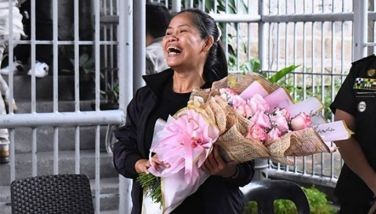CBCP urges gov't: Face corruption, cronyism
The Catholic Bishops' Conference of the Philippines (CBCP) reiterated yesterday its call for President Estrada to face issues of corruption and cronyism within the government, noting that "many cronies have returned in the trench."
![]() "If we want to go forward as a people, we must concentrate in ridding out
poverty. And we must begin with corruption in government," CBCP spokesman
Monsignor Hernando Coronel told reporters in an interview.
"If we want to go forward as a people, we must concentrate in ridding out
poverty. And we must begin with corruption in government," CBCP spokesman
Monsignor Hernando Coronel told reporters in an interview.
In a related development, the bishops likewise said they will hold a National Day of Jubilee and Fasting on April 14, 2000, a week before Good Friday.
The bishops said "it will be a special day of pilgrimage with fasting to atone for our sins, to beg for the mercy of God for our country, for our leaders, our President and his Cabinet members.
"We shall on that day offer special prayers that our government may uproot the causes of graft and corruption that have long been imbedded in the corridors of power."
Coronel expressed alarm over corruption and cronyism in the government, which the President promised to get rid of when he took office in 1998.
"Basically, we're praying. We're asking the good government to face the issues of cronyism and corruption within the government. Much of our budget does not go to the intended programs like alleviation of poverty but to corruption," he said.
The CBCP official added the Church is closely monitoring whether the President would prove true to his word and take appropriate and concrete action.
"We have given President Estrada some grace period because he wants to show that he is sincere. But we also want to remind him that the problems of cronyism and corruption are there," he said.
Coronel noted how a number of cronies of the late strongman Ferdinand Marcos are now back in the government. He however refused to disclose the names of the cronies.
"The playing field is not level, is not equal for everybody. The friends of the President have the favored and preferred business deals," he added.
Meanwhile, National Day of Jubilee and Fasting was drawn up during the recent CBCP plenary assembly in Tagaytay City where the bishops also drafted three documents on three major issues.
Presided by CBCP president Cotabato Archbishop Orlando Quevedo, the assembly was held Jan. 24 to 26 at the Betania Retreat House.
The three issues the bishops focused on were the Jubilee Celebration of the Year 2000, the threats posed to family and life by four bills filed in Congress, and peace in the country.
The reflection on the family, said Bishop Francisco Claver, came about because of certain bills being pushed in Congress which tend to erode family values.
The four bills propose the legalization of divorce, same-sex marriage, abortion, and the strengthening of the population program of the government.
"These bills are all directly against the family, and more specifically against children. And that is why we spoke up against these four bills," Claver said.
In their Pastoral Exhortation on the Great Jubilee 2000, entitled "Open Your Hearts to the Lord," the bishops called on the faithful to make use of this opportunity for personal renewal through conversion.
The Great Jubilee calls for a journey "of renewal, of repentance, of mutual forgiveness and reconciliation," the exhortation states, and so the activities for the Jubilee Year are all aimed at "the strengthening of faith and of the witness of Christians."
The third document, a Pastoral Statement entitled "Building a Culture of Peace by Respecting Life and Human Rights," touches on the divergent paths to peace pursued by the Filipino people in the past century.
- Latest
- Trending




























